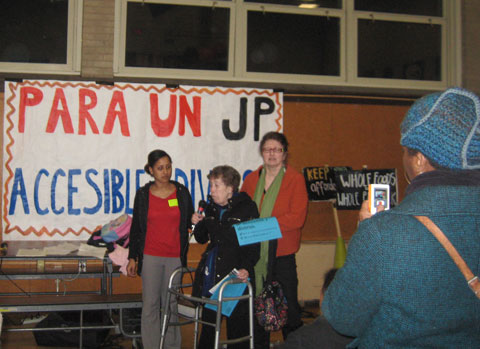
Betsaida Gutiérrez mourns the passing of the Hi-Lo. |
"I cannot buy any longer the cheap food," the activist said on Monday, addressing a crowd of about 200 at a rally in the Kennedy School gymnasium in Hyde Square. "I can no longer see my friends when I go to the supermarket. . . . Jamaica Plain is for us, not for the rich people."
By "the rich people," Gutiérrez meant those who can afford to shop at Whole Foods, the specialty grocery chain that plans to move into the former Hi-Lo building on Centre Street.
Whose Foods?, the Jamaica Plain residents' group who organized the rally, fears the Whole Foods Effect: studies show that the store's presence can increase property values up to 20 percent — and price out lower-income residents.
After the rally, residents packed the Kennedy School auditorium for a special meeting of the JP Neighborhood Council. Many waved sheets of blue paper that read, "I want an affordable and diverse Jamaica Plain."
Pat Roberts, a 30-year Jamaica Plain resident, was one of Whole Foods' small number of supporters. "I'm delighted that Whole Foods is coming to Jamaica Plain, and I can't believe my good fortune — our good fortune — that this is happening," she told the crowd. "More middle-class people have been moving in for a while now, and thank goodness," she said, and was soon drowned out by deafening boos.
"I say thank you to all those people who have come in and made this a safer, quieter, and cleaner place," she concluded, and was met with louder boos, hisses, and cries of "Racist!"
Tina Cincotti, a resident and a Whole Foods shopper, doesn't feel that way. She moved to JP 12 years ago because of its queer-friendly reputation, and since then, she's known a number of people who had to move because they could no longer afford it.
"On the one hand, I feel like part of the problem because I'm someone who didn't live here who had the money to move here," she says. "But I want to try to make a difference and keep this kind of gentrification from continuing."
By the time the two-hour meeting wrapped up, 40 residents had spoken. The Neighborhood Council will meet again next week to continue the discussion, though they have limited if any regulatory authority, says councilman Steve Backman. "Win or lose, we're looking for as much bargaining power with Whole Foods as possible."